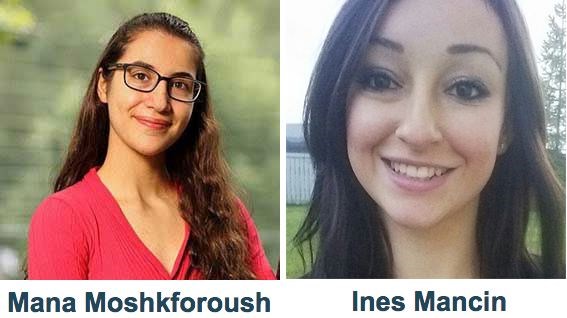Two women have been chosen to represent the two Prince George ridings at a leadership conference in Ottawa designed to encourage more women to get involved in politics.
Equal Voice launched the Daughters of the Vote event because only 26 per cent of federally elected representatives in Canada are women. In the B.C. legislature, the number is 37 per cent.
"At this rate it will take us 90 years to reach parity," said Mary Leong, an Equal Voice co-chair who sat on the B.C. selection committee that selected locals Mana Moshkforoush and Ines Mancin among 42 provincial leaders.
"That seems like an awfully long time."
Daughters of the Vote was developed as an answer, where young women age 18 to 23 will fill the 338 seats in the House of Commons in March, to mark 100 years since the first women were granted the right to vote federally.
All First Nations women - and men - weren't granted the right to vote until 1960. Research shows that many women are still reluctant to run for office.
"A lot of women don't view politics as a viable career choice for them for whatever reason, be it they have never been exposed to it or they've been turned off by it," said Leong.
Acknowledging women face barriers is a key first step toward gender equality at the ballot boxes, said Jillian Merrick.
"Once you wake up to that, then you slowly break away all the pieces, whether it's family dynamics, or women's role as a child caretaker or as a home provider or whether it's work dynamics and the types of jobs women have that generally prevent them from having flexible schedules to allow for politics or if it's the social dynamics and how women are talked about or talked to in conversation," said Merrick, who is one of three women on the nine-member Prince George city council.
The previous council had just one woman - former Mayor Shari Green - which put it far behind the United Nation's recommendation that political institutions have at least 30 per cent women, a necessary critical mass to "exert meaningful influence on policies."
And while the city has been had balanced representation provincially for many years with MLAs Shirley Bond and Lois Boone with the NDP before her, a Prince George riding has never had a woman representative at the federal level.
Gender can't be framed as a conversation about minority politics, Merrick added.
"Women are half the population. We have to get this out of our mind that this is a minority issue," said Merrick by phone from Victoria, where she's attending the Union of B.C. Municipalities convention.
"We know that governments are better when they're diverse."
That lack of diversity contributed to a conversation this week at UBCM, where a resolution to use gender-neutral language earned some push-back.
"It seems like a fairly straightforward thing to use gender neutral language, but there was really a lot of mockery from some people," said Merrick, who said changing how we treat and criticize women would go a long way.
"Often I experience 'Oh you must be too busy for this' or 'Your employer, or your husband or your kids must miss you when you're away.' Rarely do my male colleagues get asked those questions."
At the B.C. legislature Thursday, Merrick walked through an exhibit featuring women in politics, noticing how their suits stood out.
"It makes you smile a bit because you realize women do have something to offer. It's not just the colour of their suits, it's a symbolic representation of what they bring to the table," said Merrick, who praised Daughters of the Vote's approach, putting women where they can watch parliament in action and learn what it will take to get themselves there.
Mentoring is another solution and can combat the "imposter syndrome," which plagues too many young women.
"You just don't believe you're the right person for the job where the opposite is true," Merrick explained. "I certainly doubted myself at the time but now I've taken on those roles I see those doubts weren't justified.
"If you see a woman who has leadership strength, encourage them, foster them and ask them to step up."
In March, Moshkforoush will represent Cariboo-Prince George and Mancin, a probation officer, will represent Prince George-Peace River-Northern Rockies.
Last year Moshkforoush earned a $60,000 scholarship to study science at McGill University, where the Duchess Park grad is president of the inter-residence council.
The organization noted Moshkforoush is fluent in three languages and passionate about human rights and helping underprivileged youth and women.
Mancin, whose family immigrated to Canada, is "passionate about protecting the environment, ensuring adequate access to healthcare in northern B.C., and providing opportunities for motivated and talented individuals to pursue post-secondary education, free of financial constraints."
Neither were available for comment Thursday, but Leong said the more than 100 applicants showcased "brilliant young ladies... doing great things in their communities."
"The level of passion I saw come across in their applications - that they really wanted to be able to make a difference. I just found that really inspiring and it made me really hopeful for the future of politics."



